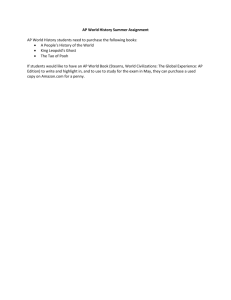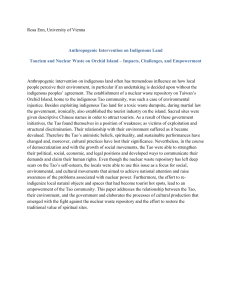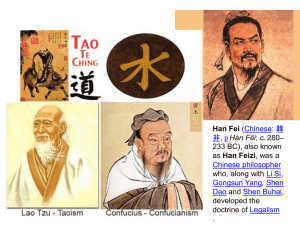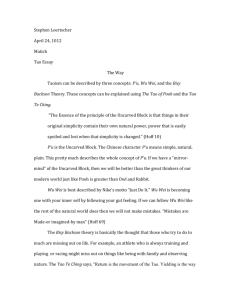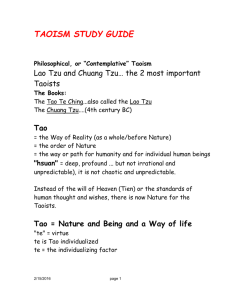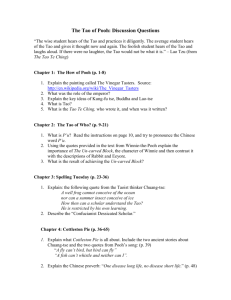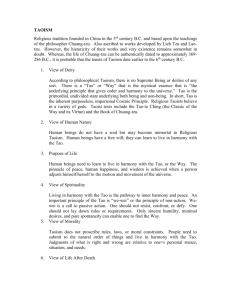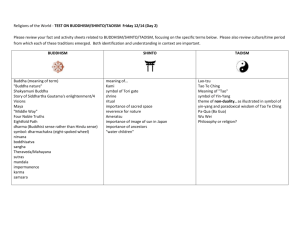(Lao Tzu). It's time to share softer strategies for
advertisement
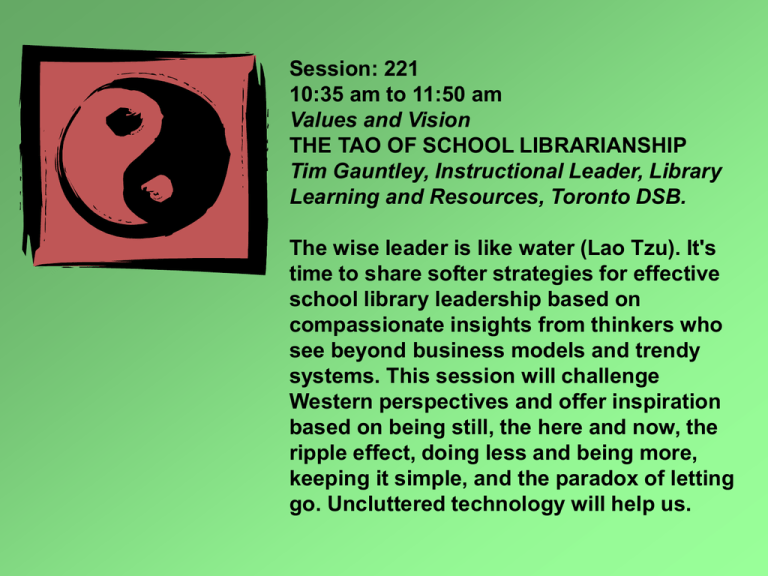
Session: 221 10:35 am to 11:50 am Values and Vision THE TAO OF SCHOOL LIBRARIANSHIP Tim Gauntley, Instructional Leader, Library Learning and Resources, Toronto DSB. The wise leader is like water (Lao Tzu). It's time to share softer strategies for effective school library leadership based on compassionate insights from thinkers who see beyond business models and trendy systems. This session will challenge Western perspectives and offer inspiration based on being still, the here and now, the ripple effect, doing less and being more, keeping it simple, and the paradox of letting go. Uncluttered technology will help us. Welcome 1. Are you in the right place? 2. The most important Taoist saying. 3. A time to let ----- go. 4. An activity already! 5. The novice, the scholar, and the abbot. The School Library in 2005 • The centre for: – All literacies – All subjects – All students – All teachers – Integration – Intervention – Lifelong learning – Student achievement The TeacherLibrarian in 2005 • Do you feel like the centre? – – – – – Understaffed Underfunded Unappreciated Unknown Unaware The Tao of School Librarianship A Choral Reading If you open yourself to insight, you are at one with insight and you can use it completely. If you open yourself to loss, you are at one with loss and you can accept it completely. Open yourself to the Tao, then trust your natural responses; and everything will fall into place. The Tao of School Librarianship • Lao-Tzu was a librarian! – his story The Tao of School Librarianship • You need it! • You already have it! • Are you ready for it? YANG TAO Deep understanding from the Way it is. TE Power from Virtue THE SAGE The Wise and Happier Teacher-Librarian YIN MUSIC/TAPE Hearing the Way PLAY Feeling the Way ART/FILM Seeing the Way FUNG-SHUI Living the Way TAO • • • • • Tao: The Way and the way Yin-Yang: Interplay of opposites Wu Wei: Non-action P’u: The Uncarved Block Ch’I: The Life Force Taoism: A Short History • • • • • • • Toronto 1965 Lao-Tzu Chuang Tzu Lieh Tse Zen Buddhism Modern China John Blofeld (tape) The tao that can be told is not the eternal Tao The name that can be named is not the eternal Name. Tao: The Way and the way The unnamable is the eternally real. Naming is the origin of all particular things. Free from desire, you realize the mystery. Caught in desire, you see only the manifestations. Ch. 1 Trans. Stephen Mitchell The Master keeps her mind always at one with the Tao; that is what gives her her radiance. Tao: The Way and the way The Tao is ungraspable. How can her mind be at one with it? Because she doesn't cling to ideas. The Tao is dark and unfathomable. How can it make her radiant? Because she lets it. Ch. 21 Trans. Stephen Mitchell The Tao doesn't take sides; it gives birth to both good and evil. The Master doesn't take sides; she welcomes both saints and sinners. Tao: The Way and the way The Tao is like a bellows: it is empty yet infinitely capable. The more you use it, the more it produces; the more you talk of it, the less you understand. Hold on to the center. Ch. 5 Trans. Stephen Mitchell When people see some things as beautiful, other things become ugly. When people see some things as good, other things become bad. Yin-Yang: Interplay of Opposites Being and non-being create each other. Difficult and easy support each other. Long and short define each other. High and low depend on each other. Before and after follow each other. Ch. 2 Trans. Stephen Mitchell Know the male, yet keep to the female: receive the world in your arms. If you receive the world, the Tao will never leave you and you will be like a little child. Yin-Yang: Interplay of Opposites Know the white, yet keep to the black: be a pattern for the world. If you are a pattern for the world, the Tao will be strong inside you and there will be nothing you can't do. Ch. 28 Trans. Stephen Mitchell Wu Wei: Nonaction Therefore the Master acts without doing anything and teaches without saying anything. Things arise and she lets them come; things disappear and she lets them go. She has but doesn't possess, acts but doesn't expect. When her work is done, she forgets it. That is why it lasts forever. Ch. 2 Trans. Stephen Mitchell When taxes are too high, people go hungry. When the government is too intrusive, people lose their spirit. Wu Wei: Nonaction Act for the people's benefit. Trust them; leave them alone. Ch. 75 Trans. Stephen Mitchell Act without doing; work without effort. Think of the small as large and the few as many. Confront the difficult while it is still easy; accomplish the great task by a series of small acts. Wu Wei: Nonaction The Master never reaches for the great; thus she achieves greatness. When she runs into a difficulty, she stops and gives herself to it. She doesn't cling to her own comfort; thus problems are no problem for her. Ch. 63 Trans. Stephen Mitchell P’u: The Uncarved Block Know the personal, yet keep to the impersonal: accept the world as it is. If you accept the world, the Tao will be luminous inside you and you will return to your primal self. The world is formed from the void, like utensils from a block of wood. The Master knows the utensils, yet keeps to the block: thus she can use all things. Ch. 28 Trans. Stephen Mitchell The Tao is called the Great Mother: empty yet inexhaustible, it gives birth to infinite worlds. Ch’I: The Life Force It is always present within you. You can use it any way you want. Ch. 6 Trans. Stephen Mitchell TE • • • • • Te: Virtue-Power Tz’u: Compassion Chih: Intuitive knowledge Ho P’ing: Harmony/Tranquility Ching: Quiessence/Meditation Te: VirtuePower Giving birth and nourishing, having without possessing, acting with no expectations, leading and not trying to control: this is the supreme virtue. Ch. 10 Trans. Stephen Mitchell Tz’u: Compassion Can you let your body become supple as a newborn child's? Can you cleanse your inner vision until you see nothing but the light? Can you love people and lead them without imposing your will? Can you deal with the most vital matters by letting events take their course? Can you step back from you own mind and thus understand all things? Ch. 10 Trans. Stephen Mitchell My teachings are easy to understand and easy to put into practice. Yet your intellect will never grasp them, and if you try to practice them, you'll fail. Chih: Intuitive knowledge My teachings are older than the world. How can you grasp their meaning? If you want to know me, look inside your heart. Ch. 70 Trans. Stephen Mitchell He who is in harmony with the Tao is like a newborn child. Its bones are soft, its muscles are weak, but its grip is powerful. Ho P’ing: Harmony/ Tranquility The Master's power is like this. He lets all things come and go effortlessly, without desire. He never expects results; thus he is never disappointed. He is never disappointed; thus his spirit never grows old. Ch. 55 Trans. Stephen Mitchell Nothing in the world is as soft and yielding as water. Yet for dissolving the hard and inflexible, nothing can surpass it. Ching: Quiessence/ Meditation The soft overcomes the hard; the gentle overcomes the rigid. Everyone knows this is true, but few can put it into practice. Therefore the Master remains serene in the midst of sorrow. Evil cannot enter his heart. Because he has given up helping, he is people's greatest help. Ch. 78 Trans. Stephen Mitchell Activities • • • • • • Feel the Tao Get in touch Go with the flow Play Be receptive Yield! THE SAGE 1. 2. 3. 4. 5. 6. Is one with the Tao Accepts and integrates opposites Does (is) more with less “Wanders” freely and easily Activates energy Enhances creativity THE SAGE 7. Expresses Te naturally 8. Explores range and perspective 9. Is free from a sense of self 10. Lets go 11. Lives simply & acts spontaneously 12. Radiates possibility The Sage: The Art of Teaching Some say that my teaching is nonsense. Others call it lofty but impractical. But to those who have looked inside themselves, this nonsense makes perfect sense. And to those who put it into practice, this loftiness has roots that go deep. Ch.67 Trans. Stephen Mitchell The Sage: The Art of Teaching I have just three things to teach: simplicity, patience, compassion. These three are your greatest treasures. Simple in actions and in thoughts, you return to the source of being. Patient with both friends and enemies, you accord with the way things are. Compassionate toward yourself, you reconcile all beings in the world. Ch. 67 Trans. Stephen Mitchell Fan Kuan [11th c.]: Travelers Among Mountains and Streams • a massive mountain, deep valley, and layers of mist. • mist represented as blank silk. • the void contasts the heavier inked sections • a sense of delicate harmony and tranquility • Charles Hartman (SUNY Albany, NY) Kuo Hsi [Guo Xi, 11th c.]: Early Spring • The moisture of early spring created by ink washes. • “with "cloud-head" texture strokes for the mountain forms and "crab-claw" branches on the trees, the landscape in this painting seems to almost pulsate, flow, and disappear (only to reappear again), suggesting the Chinese idea of the mysterious forces of Nature and the cosmos at work” • Charles Hartman (SUNY Albany, NY) Wen T'ung (1019-1079). Ink Bamboo • scholar painting • movement and grace of forms. • actual appearance of bamboo, with a metaphor for the grace and resilience of the Chinese scholar • rich contrast in the ink tones for the bamboo leaves • Charles Hartman (SUNY Albany, NY) Fang Ts'ung-I: • a tall mountain both rises triumphantly in the background, and melts in the moist, primordial atmosphere • trees on the slope and green bamboo lean in the wind. • a Taoist vision of the land as a realm where atmosphere (energy; "ch'i") flows, collects, and dissipates-representing the impermanence of nature. Mu Ch’I (1269). Six Persimmons See Creativity and Taoism, Plate 4 Wu Zhen: Fishermen • When I sit by the river, my mind is totally concentrated on fishing and nothing else. I have a good feel for the give and pull of the line so the fish are not even aware when the hook and bait enter the water. To them, the bait is no different from a grain of sand or a bubble, and they swallow it without suspecting. This is the principle of using the soft to win over the strong and the light to hold the heavy. Lieh Tzu The Tao of School Librarianship If you open yourself to insight, you are at one with insight and you can use it completely. If you open yourself to loss, you are at one with loss and you can accept it completely. Open yourself to the Tao, then trust your natural responses; and everything will fall into place.
